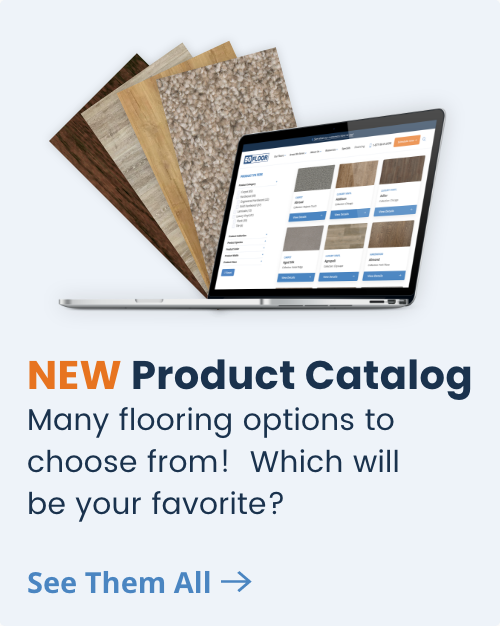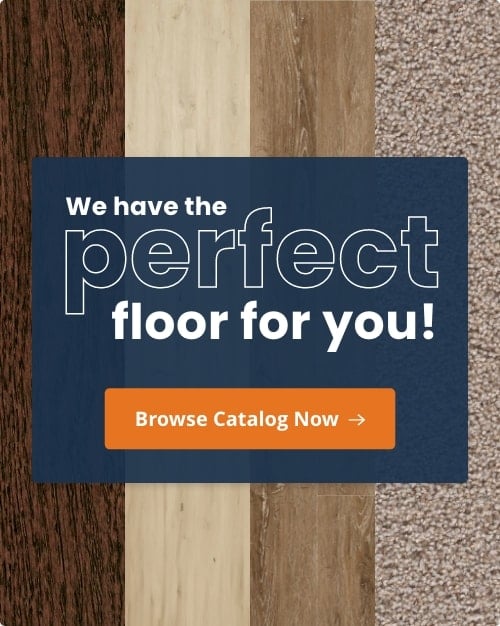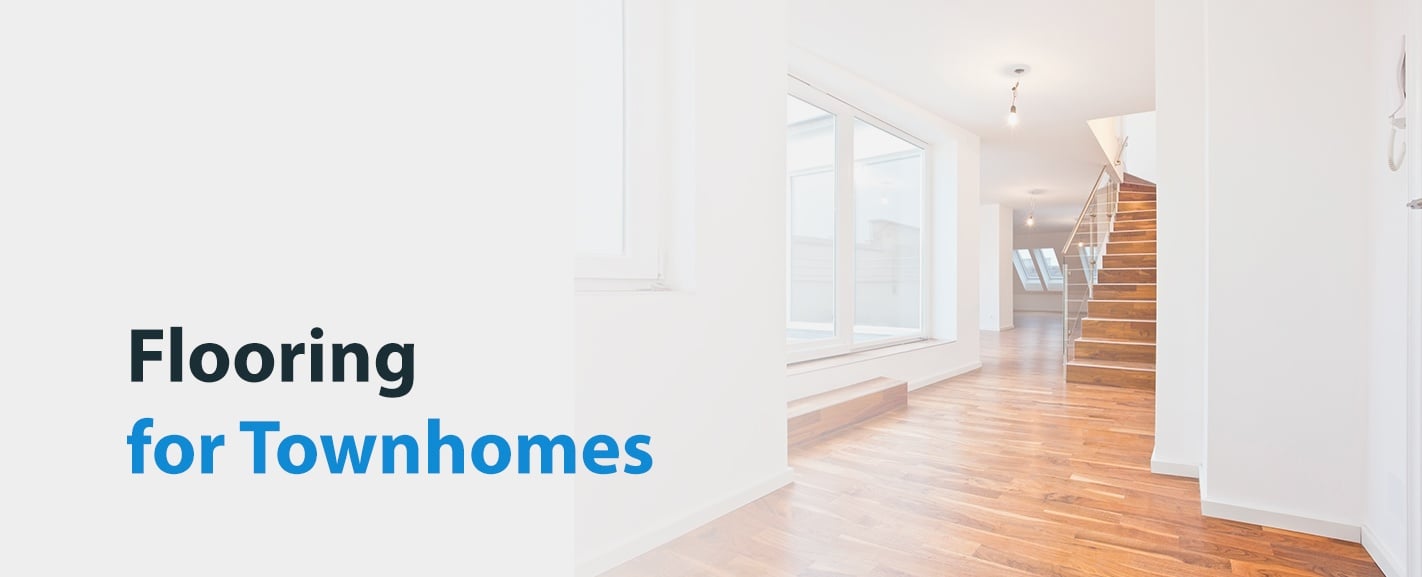

Installing high-quality flooring in your townhome provides many benefits — it transforms the appearance of your home, boosts its resale value and often makes cleaning much easier. This guide will teach you about the most popular townhome flooring solutions and how to choose the best option.
What to Consider When Choosing Townhome Flooring
Selecting the perfect townhouse flooring can often be challenging. Ask yourself the following questions when choosing a flooring material:
- How much maintenance does it require? Do you mind polishing tiles every couple of years, or refinishing natural hardwood every decade? Tile must be cleaned and scrubbed regularly to keep the grout clean, and carpet must be given much more care. Before deciding on a flooring material, be certain you can commit to the maintenance it requires.
- What colors are available? Don’t settle with a standard color if you have the opportunity to make your floor a work of art. By picking distinctive colors and patterns, you can boost your project’s value without increasing the price significantly. Artistic tile patterns, colorful carpets and rarer hardwood species are often available for a similar price as their more common counterparts.
- Is the material ideal for the level of your floor? Some flooring types work better on certain levels of a house. For instance, light carpet is often a good choice for higher floors that are not designed to support heavy weight. Also, luxury vinyl tile is a good option for basements because it can be installed below grade.
- Will your flooring appeal to future buyers? While installing a particularly exotic flooring material may bring you joy now, think about whether it will appeal to potential buyers when it comes time to sell your townhouse. Even if you plan to remain in your townhome for many years, chances are that you’ll eventually want to sell and attract buyers.
- Is the material easy to install? Will you need to wait weeks for your material to be custom cut and fit? Rare tiles or elaborate parquet patterns take time to design and install. If you’d like your flooring installed quickly, consider options like carpet, luxury vinyl or locking laminate flooring.
- What is your subfloor made of? The material that supports your current flooring will determine the types of materials you can install on top of it. For instance, if the subfloor is concrete, you will need to install a material that can handle moisture. If the subfloor is clean plywood, on the other hand, you can install almost any flooring material. If you are updating your flooring, you will likely have to remove the existing floor, especially if it’s carpet or damaged material. However, you can often install new flooring over tile, hardwood, and other materials.
- Do you foresee any lifestyle changes that could affect your decision? You should consider your future plans when picking a flooring material. Will you have a toddler or pet running around? Could you be running a business from your home?
- Does your supplier offer assistance with installation? In addition to looking for flooring, see if the supplier offers installation services. Suppliers sometimes provide services to transport your furniture and prepare the floor, which takes much of the work out of remodeling your floors, making your installation easier and faster.
- Will the flooring be able to withstand the traffic in the room? Consider how much the room will be used and figure out how long the flooring will last based on its usage. Installing more durable materials in high-traffic areas like bathrooms, kitchens and entryways will let you enjoy your flooring for 10 years or more before it shows signs of age.
Best Flooring for Townhouses
Several flooring options work well with townhouses. Before you decide, spend some time learning about the benefits of the following options:
1. Carpet
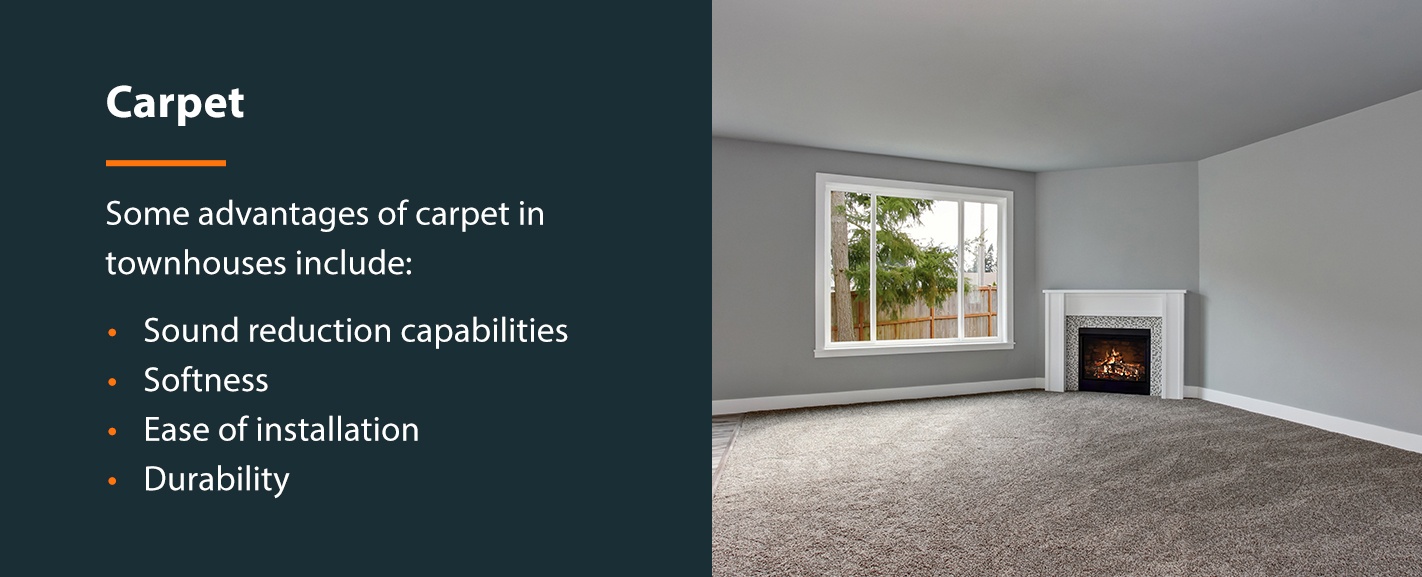

Loved for its cozy feel and wide variety of styles, carpet is one of the most common flooring types in North America. Homeowners often choose carpet for the most comfortable rooms in their townhomes, including living rooms, bedrooms, family rooms or dens. Some advantages of carpet in townhouses include:
- Sound reduction capabilities: Carpet is great at absorbing sounds, which is a nice feature when you share a wall with your neighbors.
- Softness: Carpet is one of the most comfortable types of flooring available.
- Safety: Carpet helps to soften falls, making it an excellent material for young children.
- Ease of installation: Installing carpet is easy, quick and very affordable.
- Durability: Carpet lasts a long time and can be a great choice for high-traffic rooms.
- Insulation: Carpet acts as a natural insulator, which can be highly beneficial in the winter for homes in cooler climates.
2. Luxury Vinyl
Luxury vinyl is a popular affordable flooring material known for its soft feel, thin composition and shiny appearance. Its synthetic design is durable enough to withstand your family’s everyday activities, and its versatility makes it a practical solution for nearly any room in your townhome. Some of its most significant benefits include:
- Waterproof: This material is 100% waterproof, which makes it a fantastic solution for damp environments.
- Durability: Luxury vinyl is reinforced with fiberglass, making it highly resistant to regular wear and tear.
- Scratch resistance: Luxury vinyl’s scratch layer helps stand up to scratches, scuffs and dents.
- Many options: You can find this flooring in many different styles and prints.
- Affordability: Luxury vinyl is one of the market’s most affordable flooring materials.
- Simple maintenance: Luxury vinyl is much easier to care for and maintain than other townhome flooring options.
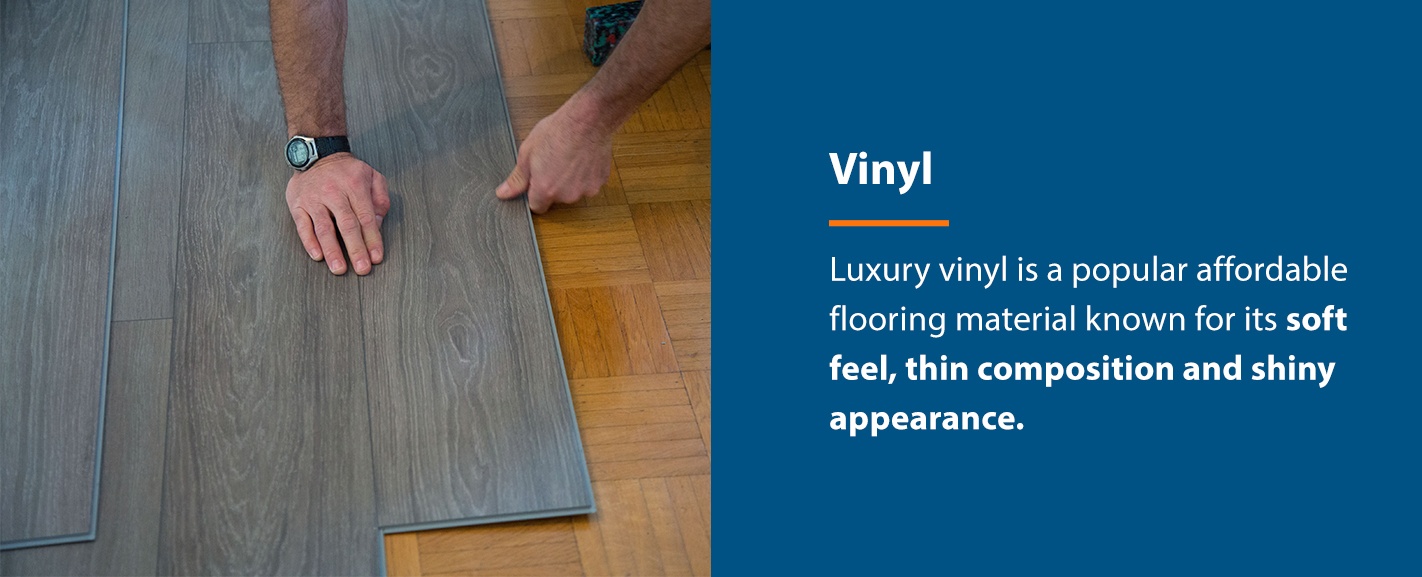

3. Tile
Luxury vinyl tile (LVT) has emerged as one of the market’s most popular flooring types, especially for townhomes. Because of its many advantages, LVT has replaced more expensive tile options like porcelain and ceramic, which are more prone to damage and more complex to install. The primary benefits of LVT flooring include:
- Appearance: LVT offers an extensive selection of patterns and colors, including options that replicate natural wood and stone at a fraction of the cost.
- Versatility: Luxury vinyl tile works well in almost every area of your home, from living rooms and kitchens to bedrooms and bathrooms.
- Durability: This material is much more durable than many other flooring options, providing a long-lasting solution for high-traffic areas.
- Waterproof: LVT can withstand leaks, spills, splashes and minor accidents for 24 to 72 hours, making it an excellent choice for high-moisture rooms.
- Easy maintenance: Caring for your LVT floor is as easy as regularly applying a damp mop and cleaning minor messes as they occur.
4. Hardwood
Hardwood has been used for ages and remains a favorite among many homeowners today. Different colors and finishes enable you to achieve various looks in your townhome, from rustic and traditional to contemporary and modern. Some of the advantages of this natural material are:
- Appearance: Hardwood floors have a warm appearance that brightens up rooms. They’re also often neutral, meaning that they can easily coordinate with many styles of furniture.
- Durability: Hardwood floors can last decades — sometimes even centuries, especially if you opt for a thicker floor. You can also apply a protective coating to minimize wear and scratches.
- Diversity: Material options like maple, cherry, birch and walnut offer an extensive color selection.
- Sustainability: Natural materials provide a healthier and more sustainable solution for your family and the environment.
- Affordable installation: Installing hardwood flooring is relatively affordable compared to tile and other materials.
5. Laminate
Years ago, laminate had a reputation for being a low-quality flooring material. This is simply no longer the case, as its quality and appearance have improved considerably due to technological advancements. In addition, waterproof laminate flooring maximizes protection and longevity in spaces more prone to spills, messes and accidents.
Homeowners are often attracted to laminate for its various benefits, which include:
- Durability: The top surface of laminate flooring is exceptionally durable and hard to scratch.
- Weight: Laminate flooring is also lightweight, making it an outstanding option for upper levels of a house that can’t support heavier flooring materials.
- Affordability: The material and installation costs of laminate are both very affordable.
- Resistance to fading: Laminate features built-in UV protectants.
- Stylish appearance: Laminate allows homeowners to mimic the beautiful appearance of natural hardwood at a much lower cost.
Schedule an Appointment With 50Floor Today
If you’re searching for a reputable dealer that sells carpet, luxury vinyl, laminate or hardwood flooring, you’ve come to the right place. Our flooring consultants will bring high-quality samples directly into your home, allowing you to see how your new floor will look against your existing light and decor. We’ll walk you through all the options and help you select the perfect flooring style that matches your climate, lifestyle and budget.
Visit our site to schedule a free in-home consultation and our friendly representatives will assist you promptly.
